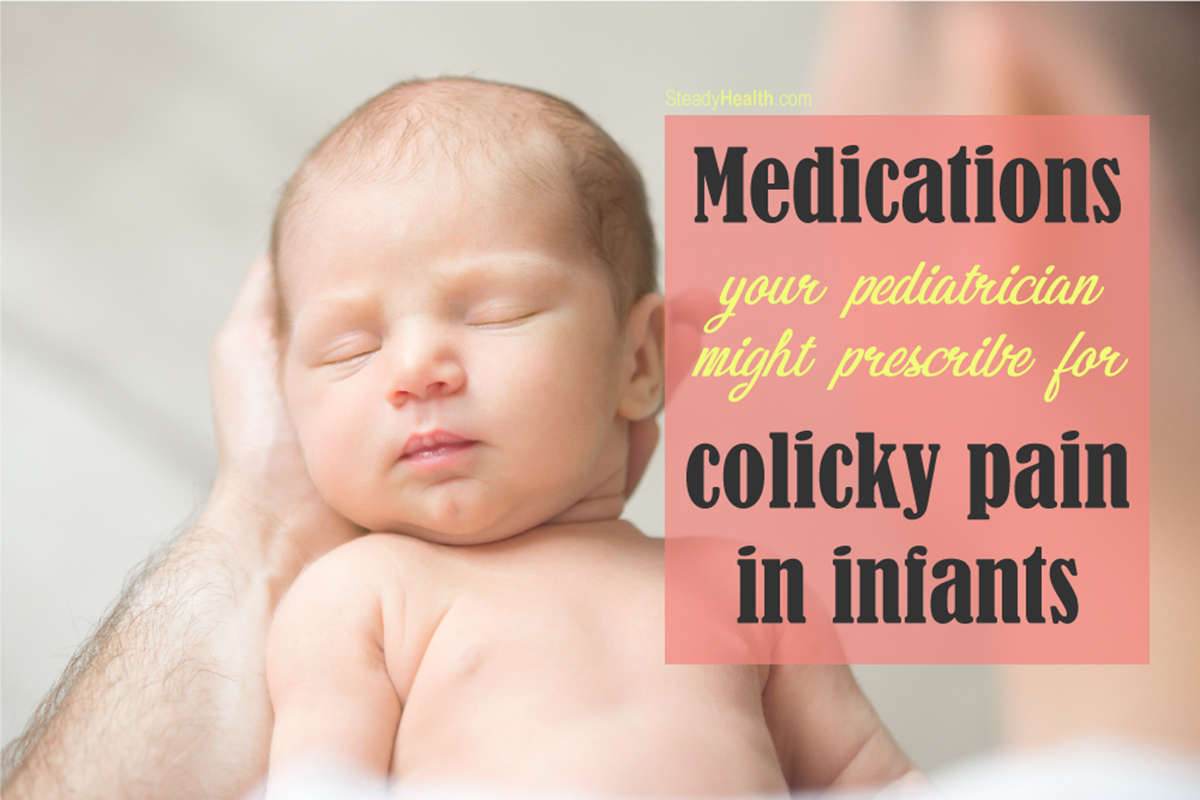Infantile colic is a benign process in which an otherwise healthy infant has outbursts of inconsolable crying. It peaks when the baby is around six weeks old, and usually ends by four months of age. The occurrence is equal in boys and girls, and similar between breastfed and bottle fed babies. Socio-economic status plays no role either. [1]
Proposed causes of colicky pain include intolerance to cow's milk protein or lactose, increased serotonin secretion, poor feeding technique, maternal smoking, gastrointestinal immaturity, and inflammations, among others. Several studies have been trying to link colic with migraines. [2, 3]

Medical Evaluation For Colic
A medical treatment for colicky pain isn’t usually recommended as colic improves on its own after a certain period, but some parents find it extremely hard to cope with their baby’s struggling and crying so they often ask for a doctor's help. Even though it’s benign, colicky pain and crying is of the main causes of pediatric visits in the early part of a baby’s life [3].
When parents bring their crying infant to the doctor suspecting colic, it’s crucial to rule out other possible health conditions. A pediatrician typically examines the baby to distinguish colic from other possible causes of crying, especially serious and treatable diseases such as:
- Urinary tract infections [4]
- Ear infections
- Cow’s milk protein intolerance [5]
- Appendicitis
- Acid reflux [6]
- Meningitis
- Glaucoma
- Fractured bone
- Hair tourniquet syndrome [6, 7]
Infants with colic typically have no abnormalities, but several symptoms (if they occur) are of particular concern and they include:
- Diarrhea or constipation
- Vomiting
- Fever
- Lethargy
- Poor weight gain or weight-loss
- Respiratory troubles
After all the possible diseases and reasons for crying have been ruled out, colic can be diagnosed. Most pediatricians will avoid prescribing medications for infantile colic as there isn’t much evidence for their effectiveness. Even if they do prescribe drugs, it is recommended to try one at a time for about a week to check whether they’re efficient in the treatment of colic. The most commonly prescribed and only investigated pharmacological agents for colic are Simethicone and cimetropium bromide. [8]
Simethicone
Simethicone is typically prescribed to reduce bloating, but only for severe colic. Although many parents claim it effective, a randomized, double blind, placebo-controlled study showed Simethicone to be no more effective than a placebo when it comes to colicky pain [9]. It relieves the gas caused by swallowed air or certain formulas in a way that it combines small gas bubbles, thus producing a larger bubble that is easier to pass.
Just make sure that the baby is not taking other medications because parents reported a possible interaction between Simethicone drops and levothyroxine (a medication used to treat low thyroid activity). [11] Notify your pediatrician about your baby’s eating habits, and medications taken, if any.
Cimetropium Bromide
Cimetropium bromide is a drug that relieves bowel muscle spasms. It showed as successful in reducing fussy crying in 74 percent of studied infants with colic, but with sleepiness as a side effect [12]. It’s used extensively in Italy in the last few years.
Medications To Avoid
Sedatives, such as alcohol (gripe water), Phenobarbital, or chloral hydrate may be tempting to try, but DON’T. Their over-the-counter availability gives the illusion of safety, but using these medications means that the baby will spend more time sleeping than crying, not because they’re effective in the treatment of colicky pain, but because the baby is drowsy and sedated.
Antihistamines (promethazine, dimenthdrinate, brompheniramine, diphenhydramine) are also used in the treatment of colic because of their sedating properties, but avoid using these too, as the potential risk of side effects outweighs benefits, if any. Phenergan (promethazine) has been linked with an increased risk of Sudden Infant Death Syndrome (SIDS) [13]. Here you can read more about dangerous treatments for colicky pain in infants.
In Conclusion
No drug for colic in infants is completely safe. Many possible side effects may occur such as heartburn, dry mouth, rapid heartbeat, confusion, dizziness, breathing difficulties, weakness, nausea, vomiting, constipation, and various allergic reactions, among others.
Try to remain calm and positive during the hard days. Remember it will pass in a couple of months, and you’ll have a happy and a thriving baby.
- Photo courtesy of SteadyHealth.com


Your thoughts on this